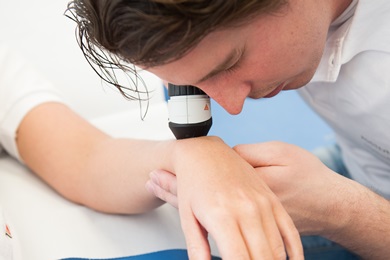Skin cancer
The types of skin cancer that appear most often are squamous cell carcinoma, basal cell carcinoma and melanoma. All three types can be present in many different ways. Squamous cell carcinoma is most often present as a red patch or bump, that is either crusted or scaly. In many cases, it is a fast growing tumor. Basal cell carcinoma typically presents itself as a lesion with a pearly translucency to fleshy colour. It often has small blood vessels on the surface. In some cases, ulceration is present as well. The key term, however, is translucency. Melanoma appears most often als an area that is asymetrically pigmented. It has an irregular border, varies in colour and is often bigger than 0.5cm in diameter. UV-light can be considered as the major cause for the three most frequent types of skin cancer. Risk factors for developing skin cancer are therefore factors such as sunny vacations, outside professions or residency near the equator. Specific traits for developing melanoma can be inherited. A dermatologist will always check whether melanoma is found among members of the family.
Treatment of skin cancer
A dermatologist is able to detect skin cancer. If you’ve been diagnosed, there are several options for treatment. Which treatment will be used, however, depends on the type of skin cancer you’ve been diagnosed with. see here for more information in Dutch. Sometimes, it is a possibility to treat basal cell carcinoma with a topical cream. In most cases, however, it is necessary to excise the skin cancer from the skin. An advantage of this invasive procedure, is that the pathologist can verify whether the tumor is completely removed from the skin. In the Roosvelt Clincis, you are in the hands of experienced and well trained dermato-surgeons. After removal, the surgeon will make an extra excision around the scar. This is dictated by the guidelines of treatment of melanoma in The Netherlands. Sometimes, it is necessary to refer to an academic medical center. However, this is only in very rare cases.
Costs to detect skin cancer in the Roosevelt clinic
If you’ve been referred to the dermatologist in the Roosevelt clinic by your general practitioner, the skin cancer check will be covered by your health insurance. However, it is also possible to arrange an appointment without referral from your general practitioner. If the dermatologist suspects anything, you will be informed immediately. It is possible to have the lesion surgically removed and sent to a pathologist for analysis. This second step, however, brings extra costs. If treatment is necessary, it is in most cases best to get a referral from your general practitioner. For a pricelist check here
Make an appointment with the dermatologist, click here.
